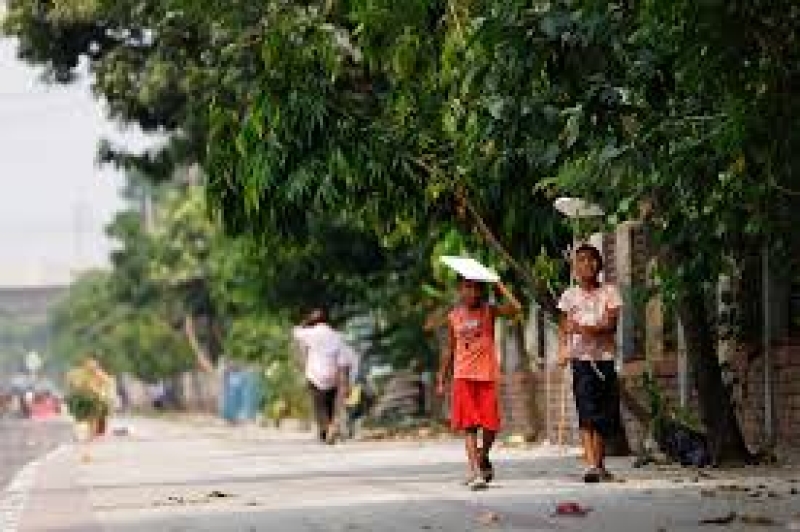- Youth participation vital to BD’s democratic future: C’wealth Group |
- Stocks retreat on week’s first trading day as turnover drops |
- Free education for girls up to honours if BNP wins: Zubaida Rahman |
- Dhaka ranks second worst in world for air pollution |
- Bangladesh stocks end week higher on upbeat mood |
Political unrest in BD threatens climate agenda stability

Following the ouster of Bangladesh's long-time leader amid mass protests, environmental activists are urging the interim government to prioritize climate change as it tackles the immediate challenges of restoring stability.
Nobel Laureate Muhammad Yunus was sworn in as interim leader on August 8 after a wave of student protests demanding job opportunities spiraled into a larger uprising, resulting in numerous casualties and forcing former Prime Minister Sheikh Hasina into exile. The duration of Yunus’s technocratic government remains uncertain, with legal experts suggesting it could last a year or more. Yunus, 84, has expressed a commitment to implementing essential reforms in the judiciary, security forces, and bureaucracy before scheduling new general elections.
Despite the pressing need for societal and economic stabilization, experts caution that climate change should not be sidelined. Bangladesh, ranked ninth on the World Risk Index for climate vulnerability, faces severe risks from extreme weather events that threaten food security and public health.
Zakir Hossain Khan, CEO of the Dhaka-based think tank Change Initiative, emphasized the importance of maintaining momentum on climate action. "We need to reassure investors and partners both domestically and internationally that we will build on our progress in tackling climate hazards and accelerate our energy transition," Khan said.
Yunus, renowned for his work in microfinance and recipient of the Nobel Peace Prize in 2006, has appointed a council of over 20 advisers to act as his cabinet. Notably, Syeda Rizwana Hasan, a prominent environmental lawyer and activist, will oversee the environment and climate portfolio. Hasan’s track record in environmental advocacy has raised hopes that climate issues will receive heightened attention in Yunus’s administration.
Hasan has promised to address pollution, protect wetlands, and reduce single-use plastics, though specific plans for Bangladesh’s climate strategy have yet to be detailed.
Environmentalists are particularly optimistic about Hasan’s role. "With an environmental activist in charge, we expect a stronger focus on climate action that benefits ordinary Bangladeshis," said Sohanur Rahman, executive coordinator of YouthNet for Climate Justice. Rahman’s colleague, Ishtiak Ahmed Srabon, was killed during the recent protests.
The protests, sparked by widespread frustration over job scarcity amid rapid economic growth, propelled Yunus to power. Addressing the job crisis could involve creating employment opportunities through a "just energy transition," according to Rahman. Progress towards the previous government's goals—creating 40,000 "green jobs" by 2030 and generating 40% of electricity from renewable sources by 2041—has been sluggish.
To meet the estimated $230 billion required over the next 25 years for climate adaptation, Bangladesh needs to accelerate the transition to renewable energy while curbing fossil fuel expansion. The Bangladesh Climate and Development Platform (BCDP), established last December, aims to mobilize investment in climate initiatives. For its success, skilled workers must be trained and retained, Khan noted.
The climate emergency continues unabated, with recent floods impacting several districts in northeast and southeast Bangladesh. It is crucial that ongoing climate policies, such as the national adaptation policy, are preserved during the transition, Khan added.
Despite recent authoritarian tendencies under Hasina, Bangladesh has been a notable advocate for low-income countries facing climate change. The country has received international praise for its climate adaptation efforts and has led the Climate Vulnerable Forum twice, advocating for fairer climate finance for the Global South.
As Bangladesh prepares for COP29 in November, the country will need to push for a more substantial share of grant-based financial support for climate adaptation and submit updated greenhouse gas reduction targets by 2025. Mizan Khan of the LDC Universities Consortium on Climate Change emphasized the need for increased grant-based finance to avoid debt distress.
"Bangladesh should aim for a 'people's NDC,' involving grassroots and youth in the decision-making process," said Rahman. As Yunus navigates Bangladesh’s evolving political landscape, incorporating a just transition plan that addresses the needs of all, including women, youth, and migrants, will be crucial for both national reconciliation and climate progress.

